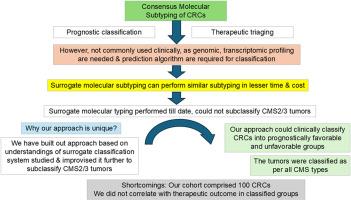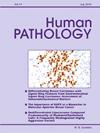Evaluation of a novel surrogate panel for classifying human colorectal carcinomas according to consensus molecular subtypes
IF 2.6
2区 医学
Q2 PATHOLOGY
引用次数: 0
Abstract
Clinical triaging of colorectal carcinomas (CRCs) is essential for prognostication and therapeutic decision-making. Consensus Molecular Subtyping (CMS) was developed for this purpose; however, it requires comprehensive genomic and transcriptomic studies and prediction algorithms, restricting its usage. We examined the utility of a limited surrogate panel of markers for classifying CRCs. We investigated the expression of immunohistochemical markers MLH1, PMS2, MSH2, MSH6, CDX2, HTRB2, FRMD6, and GLUT1, along with reverse transcriptase polymerase chain reaction for KRAS mutation in a retrospective cohort of 100 CRCs. MMR-deficient cases were classified as CMS1. Differential expressions of other markers, alongside consideration of KRAS mutation status as per CMS guidelines, were utilized to classify the tumors into three additional groups. A significant correlation was observed between tumor subtypes and TNM stage groups (P 0.04). While most stage I and II tumors were CMS1 (77.1 %, n-27/35) and CMS2 tumors (91.7 %, n-11/12), stage III and IV tumors were mostly CMS3 (50 %, n-6/12) and CMS4 (44.8 %, n = 13/29) tumors. Our algorithm classified the CRCs into prognostically favorable CMS2/CMS3 types, then unfavorable CMS1/CMS4 types. Notably, However, overall survival and disease-free survivals did not differ as per the individual CMS types. This study highlights the potential of surrogate tumor typing for clinical triaging. However, further research, building on the findings of this study and existing IHC-based classifiers, is essential to develop a more effective and practical surrogate classifier.

根据一致的分子亚型对人类结直肠癌进行分类的新型替代面板的评估。
结直肠癌(crc)的临床分诊对预后和治疗决策至关重要。为此开发了共识分子分型(CMS);然而,它需要全面的基因组学和转录组学研究以及预测算法,限制了它的使用。我们研究了一组有限的替代标记物对crc分类的效用。我们研究了免疫组织化学标志物MLH1、PMS2、MSH2、MSH6、CDX2、HTRB2、FRMD6和GLUT1的表达,以及KRAS突变的逆转录酶聚合酶链反应。mmr缺陷病例被分类为CMS1。其他标记物的差异表达,以及根据CMS指南考虑KRAS突变状态,被用来将肿瘤分为另外三组。肿瘤亚型与TNM分期之间存在显著相关性(P < 0.04)。I期和II期肿瘤以CMS1 (77.1%, n-27/35)和CMS2 (91.7%, n-11/12)为主,III期和IV期肿瘤以CMS3 (50%, n-6/12)和CMS4 (44.8%, n = 13/29)为主。我们的算法将crc分为预后有利的CMS2/CMS3型,然后是不利的CMS1/CMS4型。然而,值得注意的是,总生存期和无病生存期并没有因个体CMS类型而异。本研究强调了替代肿瘤分型在临床分诊中的潜力。然而,基于本研究结果和现有基于ihc的分类器的进一步研究对于开发更有效和实用的替代分类器至关重要。
本文章由计算机程序翻译,如有差异,请以英文原文为准。
求助全文
约1分钟内获得全文
求助全文
来源期刊

Human pathology
医学-病理学
CiteScore
5.30
自引率
6.10%
发文量
206
审稿时长
21 days
期刊介绍:
Human Pathology is designed to bring information of clinicopathologic significance to human disease to the laboratory and clinical physician. It presents information drawn from morphologic and clinical laboratory studies with direct relevance to the understanding of human diseases. Papers published concern morphologic and clinicopathologic observations, reviews of diseases, analyses of problems in pathology, significant collections of case material and advances in concepts or techniques of value in the analysis and diagnosis of disease. Theoretical and experimental pathology and molecular biology pertinent to human disease are included. This critical journal is well illustrated with exceptional reproductions of photomicrographs and microscopic anatomy.
 求助内容:
求助内容: 应助结果提醒方式:
应助结果提醒方式:


